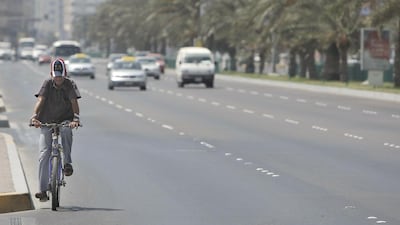It's quite dangerous to encourage people to cycle to work in Abu Dhabi (Non-riders must learn to respect cyclists, January 6). Car drivers are not used to seeing cyclists on the road, they drive at high speed and the cycle paths are inadequate.
Also, there is nowhere to lock up bikes safely, and I doubt that many companies provide shower facilities.
We need an extensive, interconnected network of cycle paths and bike lanes before we can cycle to work safely.
Leith Suheimat, Abu Dhabi
It's nice to have a map of cycling routes (Prepare for the ride of your life, January 15). However, when I was riding on Khaleej Al Arabi Street towards Musaffah the other day, I discovered that the safe lane extends only up to Adnec. I rode on the grass. It was fun, but I would not recommend it.
Leonard Raf Peñano Paracha, Abu Dhabi
At a time when Abu Dhabi and Dubai are experiencing a cycling revolution, it's disheartening to know about the confiscation of 300 cycles in Sharjah (Sharjah gets tough on bicycle safety, January 6). Where are cyclists supposed to ride if there are no dedicated cycling tracks?
Ahmed Chohan, Dubai
Today’s youth need to see the world
I refer to Ayesha Almazroui's article Young Emiratis need to know what it is to be poor (January 7).
It’s good to know that she has been to India. It must have been an enriching experience. However, she says: “Our children grow up surrounded by expensive toys, not realising how children in other countries struggle just to meet their basic daily needs... It is easy for us to lose sight of what is happening elsewhere in the world, even in our own neighbourhood.” Growing up with expensive toys has nothing to do with Emiratis not realising the struggle of people in other countries. I see no relation between these two statements.
I also see no harm in raising our children with “expensive” toys. It is ignorance that will hurt our children. Anyhow, I must disagree with her when she says that we can easily lose sight of what is happening in other parts of the world. I believe that this generation is more engaged in world affairs and events than ever, thanks to social media.
She also says: “But there are positive steps that can be taken. One approach could be to get more Emiratis to participate in programmes such as Volunteer Globally...”
Has she not heard of Habitat for Humanity through which Emiratis go to countries such as Nepal, Ethiopia and Kenya to build houses? Has she not heard of Takatof, a programme that specialises in getting Emirati volunteers to help at different events? Has she not heard of the Emirates Foundation, which has a number of programmes that Emiratis are participating in? These programmes are all active.
Maha Yaqoot, Abu Dhabi
I spent just over a month in Mumbai slums for a film shoot and I thought it was great. They don’t have much but they smile with love.
Instead of pitying them, go and have tea with them. It’s not as bad as everyone makes it out to be.
Reshel Shah Kapoor, Dubai
I agree that everyone who has had a life with plenty of things, lots of food and a comfortable home, needs to see how the majority of the world’s population lives. These kinds of experiences usually lead to some change, especially through policy formulation.
Sometimes, they even prompt some people to change their way of life, say, by not throwing away food or wasting money on things that really don’t do anyone much good.
Shondale Jackson Pagano Galindo, Dubai
Why postnatal support is vital
At the nonprofit support group Out of the Blues, we truly appreciate the editorial New mothers need every help (January 4).
However, we would have loved to see more detail on why postnatal support is so vital and what are the potential consequences of having little or no support or even overbearing family members who apply too much pressure.
Andrea Jane Guy, Dubai

